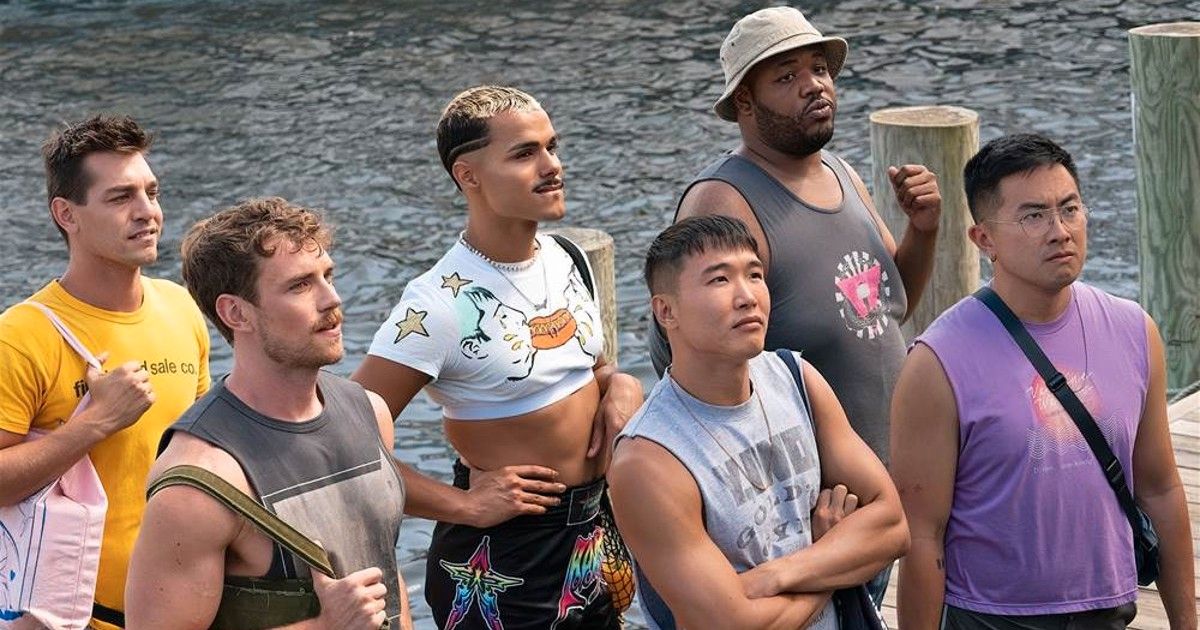See if this makes you burst out laughing. Someone time travels Jane Austen into 2022. That person explains to Austen how beloved her novel has become, and how it has been adapted countless times since she wrote it. She then asks “What was the most recent one?” And someone tells her, “The one with gay Asians Ubering to an island off the coast of the United States.” At which point Jane Austen’s head would explode at the litany of terms she’s never heard before. But that inherent confusion is part of the charm of Fire Island, a delight of a film that will have you smiling the whole time, excited to be a part of this incredible party.
Jane and Elizabeth Bennett are played by Howie (Bowen Yang) and Noah (Joel Kim Booster), former lovers who are now longtime friends, essentially family. Joined by their other buddies Luke (Matt Rogers), Keegan (Tomas Matos), and Max (Torian Miller), the gang travels to Fire Island, an island just west of the Hamptons in New York, and an LGBT haven for years. Staying with their lesbian mother Erin (Margaret Cho), the 5 guys get to enjoying the partying and hooking up that awaits them. Noah in particular wants to help Howie, who becomes enamored of Charlie (James Scully) and vice versa, to the chagrin of Charlie’s friends like Will (Conrad Ricamora), who initially appear pretty unenthusiastic towards Howie and Noah, putting it lightly.
Noah himself, Joel Kim Booster, wrote Fire Island’s screenplay, which makes sense, with the really brilliant specificity with which gay vacays perfectly translate to 1800s England. The class definition modernization was by far the most interesting, leading to the inevitable party at the “rich” boys house: which in this case means Caucasian, top shelf liquor people, and the new one – ironing board abs with an overall ripped physique. This of course leads to all sorts of “appalling” behavior for the 2020s, like getting shitfaced and overindulging on the charcuterie. Personally, I choose the gay parties of 2022 over the stuffy chaste 1800s ones anyday, replete with dancing and romantic partners wearing no clothes, but still filled with class specific carve outs. End goals for the Bennet girls are marriage, but for Howie and Noah its, kinda sweetly, specific to each of them at this point in their life, a nice modern gay twist. And, in the most amusing sequence in the movie, party games are now Heads Up! shout fests that frighten the bejesus out of Will, to establish your social currency alongside your real one. Booster’s screenplay slides each of the pieces right into place, giving Fire Island that familiar but fresh feeling every classic retelling hopes to achieve.
Because Pride & Prejudice is a classic for a reason, a reason which Joel Kim Booster and Bowen Yang repeatedly show the audience. Booster is every bit the charm machine Elizabeth Bennett is in Austin’s novel, playing the leading man with effortless ease. He plays off Conrad Ricamora’s stoic awkward energy really well, eventually revealing underneath that bravado is a fear of vulnerability to someone he likes that might like him back….even when Will throws away his ice cream cone to hide (the best running gag of the movie). Bowen Yang proves here he’s gonna be a star, maybe even moreso than SNL. Yang gives a great movie performance here – there’s no over the top acting anywhere – while still coming off emotionally disappointed but eager and hopeful to get his romcom cliché. Yang and Booster also do a great job here of selling their platonic friendship, without making us root for them to hook up with each other. I mean, in the end, we all gotta sing along to our buddy’s karaoke jam, right?
And props to Andrew Ahn, the director. Like John Chu did to Singapore in Crazy Rich Asians, Ahn sells the sh*t out of Fire Island, tourist destination. I’m not even gay, and I have looked up the place repeatedly, because of how fun, gorgeous, and alive Ahn makes Fire Island feel. So, and I say this with absolute prejudice, eff you Montauk and the Hamptons! Fire Island is going to be my vacation of choice in New England.

